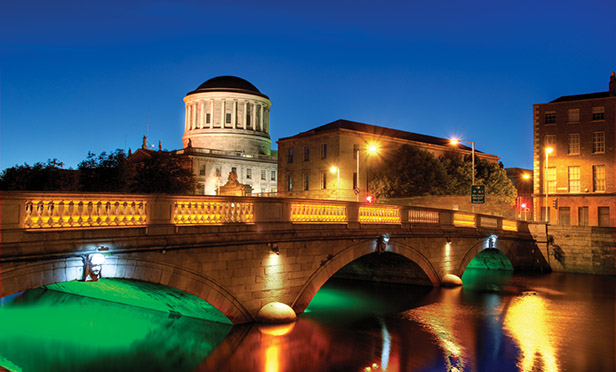As UK-qualified lawyers seek to register in Ireland in order to continue advising on European Union (EU)-related matters, big firms with a presence in the country could see an increase in workload as companies consider shifting operations or even redomiciling in the Emerald Isle, amid the economic turmoil wrought by Brexit’s aftermath.
Declan Black, managing partner of Mason Hayes & Curran, said that while it is impossible to predict the economic consequences Ireland will face as a result of the Brexit vote, there are a number of possibilities that he views as significant to the Irish legal market moving forward.
Because Ireland will be “the only remaining English-speaking, common law tradition country in the EU and eurozone, it makes [Ireland] the logical gateway for investment for countries that share that heritage,” including the US and Canada, as well as Australia and New Zealand, according to Black.
In terms of financial services clients, Black added that Dublin rises to the top of a short list for relocating functions or structuring transactions. He said it remains to be seen whether English law will maintain its dominant position in governing cross-border deals, but noted that Irish law could eventually take on a more prominent role.
At McCann FitzGerald, former chairman and Brexit group leader John Cronin said his firm has already received a large number of inquiries from clients interested in moving some of their operations to Ireland.
Cronin said Dublin is “well-suited to accept this transfer of business” from financial services providers, specialising in areas like asset management and insurance, because the city has had the requisite architecture – be it through sophisticated Irish firms or more brick-and-mortar developments – in place for large-scale transactions and corporate clients since the rise of the Celtic Tiger in the 1990s.
John Larkin, partner and head of the insurance group at Irish firm William Fry, cites cultural similarities and favourable tax arrangements as additional benefits that Ireland can provide in order to entice companies to consider alternative jurisdictions to access the EU’s single market. After the Brexit vote, it remains unclear whether UK entities will retain access to that single market.
Larkin said it is too early for those types of decisions to be made, but such decisions should resolve themselves within the two-year period it will take to formally exit the EU.
“We are reassuring clients that until the UK and EU agree on exit arrangements, the status quo in terms of the law remains the same,” said Shane Kelleher, partner and head of the financial regulation department at William Fry in Dublin.
One group in particular that may see a shock to the status quo is the UK’s lengthy list of financial technology companies.
McCann FitzGerald expects to see ample work generated by so-called fintech companies based in the UK, said Gary McSharry, lead partner of the Irish firm’s New York office, which opened in February. The booming group of companies is currently regulated throughout the EU by ‘passporting’ laws, and could also face challenges when it comes to the movement of talent.
As for Arthur Cox, another leading Irish firm, its London office head Aiden Small said it has been fielding Brexit-related inquiries from clients operating in the financial services industry and others, from small businesses to larger organisations. Small added that larger entities have been more proactive in seeking legal counsel as a result of the Brexit vote.
Miriam Gonzalez, London co-chair of the international trade and government regulation group at Dechert, which has an outpost in Dublin, said her firm has been beefing up its regulatory ranks during the past year in advance of the Brexit vote. She said Dechert anticipates an increase in EU regulatory and international trade work.
Client inquiries regarding moving operations have thus far been focused on “if we had to move, where would we move”, rather than “actually wanting to move”, Gonzalez said, adding that if needed, Dublin and Luxembourg remain viable options for clients fleeing London. In the immediate future, legal uncertainty surrounding Brexit will be good for law firms, added Gonzalez. That will have to be balanced, however, with the potential for a challenged British economy.
Mason Hayes’ Black, a former travelling book salesman, said Ireland needs to maximise any economic opportunities created by Brexit, if only to offset “poor economic consequences” that could arise from the split between the UK and EU. Black said that when his partners visit the US, they will speak about the benefits of investing in Ireland, citing the country’s stable legal environment and the benefits of being under EU law. He added that he expects his competitors at other Irish firms to continue doing the same.
NOT FOR REPRINT
© 2024 ALM Global, LLC, All Rights Reserved. Request academic re-use from www.copyright.com. All other uses, submit a request to [email protected]. For more information visit Asset & Logo Licensing.













